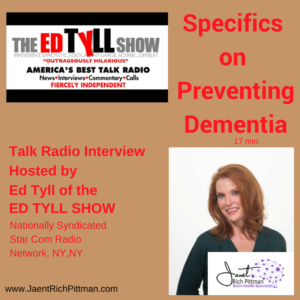Specifics on Preventing Dementia

Star Com Radio Network, The Ed Tyll Show, 17 minutes: The basics for preventing dementia was on Ed’s mind as he hosted The Brain Nerd on his nationally syndicated show. Enjoy listening to our conversation [17 Minutes] (Or you can read the transcript below but you feel the energy, are up-riveted by the hope and laugh at how we carry on–words cannot give that to you). Let me know if you have any questions.


